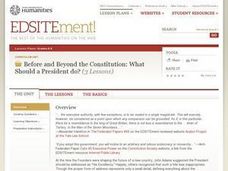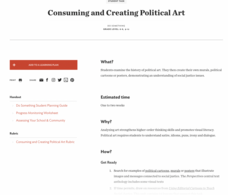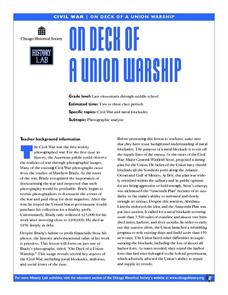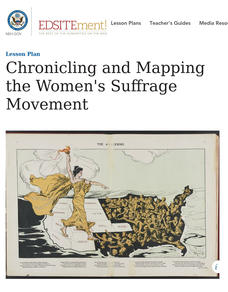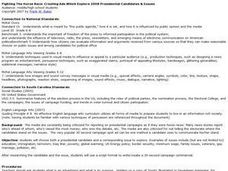Curated OER
Before and Beyond the Constitution: What Should a President Do?
Students discuss the powers and responsibilities of the President, list some precedents established during Washington's presidency, and match presidential actions with the type of Executive power it is.
Teaching Tolerance
Consuming and Creating Political Art
A picture is worth a thousand words, but political art may be worth even more! After examining examples of political cartoons, murals, and other forms of public art, class members create their own pieces to reflect their ideals and...
Curated OER
Jefferson vs. Franklin: Revolutionary Philosophers
Learners examine the contributions of Benjamin Franklin and Thomas Jefferson to American Independence. In small groups, they conduct Internet research, read and discuss primary source documents, and complete a chart.
Edible Schoolyard
Pan de los Muertos
Accompany instruction and the celebration of El Dia de los Muertos with a loaf of Pan de los Muertos. Here, scholars measure ingredients precisely to create tasty bread, write a remembrance for someone who has...
Curated OER
Our Classroom Constitution
Develop a system of classroom rules created by the kids, for the kids with this three-part instructional activity series on the US Constitution. After learning about the structure of the Constitution and the government it...
Jamestown-Yorktown Foundation
Why Did Some Colonial Virginians Continue to Support the King?
Not all colonials supported the American Revolution. A resource from the American Revolution Museum at Yorktown ask young historians to investigate the reasons why some colonial Virginians were loyalist and continued to support King...
Curated OER
On Deck of a Union Warship
Students examine role of Naval blockades in Union war strategy, and analyze primary source image "On Deck of a Union Warship" and make detailed observation about people and activities shown.
Judicial Learning Center
Do You Know Your Bill of Rights?
The Bill of Rights is much more than an important piece of paper! The rights cover everything from freedom of speech to the right to remain silent if arrested. Scholars find out their own rights by answering the questions in the form of...
Curated OER
Songs of the Civil War
Students investigate music of the Civil War era and explore how music can be used to arouse and express emotion. They identify a rhythmical musical pattern and match lyrics to it.
Curated OER
Campaign Ad Critique
Students analyze current campaign TV ads and literature. They identify the ad by "type." They learn to look beyond the ad to understand its intended purposes and its real content.
Curated OER
The 44th and 45th USA Presidents
The transition of power between former President Barack Obama and President Donald Trump may be the first political process that your students have followed. Fill out the details between these two leaders with a set of vocabulary...
Curated OER
Battle of New Orleans
The last battle during the War of 1812, was the Battle of New Orleans which is outlined in this detailed PowerPoint. This particular battle is described from the beginning until the end, when General Andrew Jackson became a hero....
Curated OER
Fort Jackson and Fort St. Phillip
Review the history of Fort Jackson and Fort St. Phillip during the American Civil War in this informative PowerPoint. Included in this presentation are interesting facts, photos, and maps to increase student understanding of these...
Curated OER
Express Your Opinion
Learners explore local, state, and national levels of government and discuss which level of government they should contact to get information, express their opinions, or get help on specific issues.
National Endowment for the Humanities
Chronicling and Mapping the Women's Suffrage Movement
While women's suffrage is often believed to be the result of a single constitutional amendment, the effort of women to secure the vote spanned decades and continents. Using primary sources in online archives, class members explore the...
National Endowment for the Humanities
Empire Intelligence Briefings
To trade or not to trade. Young diplomats put their country's best foot forward in a series of briefings for other countries about their nations. The goal is to persuade others to engage in diplomacy and trade. Using a previous lesson...
National Endowment for the Humanities
Hosting a Diplomatic Reception
The toasts are written, the table is set: it's time to party! Young scholars use a role-playing activity to go toast to toast. After researching and writing toasts for their allied countries during the modern Age of Empires, individuals...
Curated OER
China is Unique
Sixth graders study the culture of China by comparing it to that of the United States. They write all questions and notes in a journal. The students access the internet to obtain the information and internet sites are suggested in the...
Curated OER
Blueberries: A Native American Treasure
Youngsters study the history and uses of the blueberry. There are actually six different lessons linked into this plan! The lessons can be useful within a variety of curricular areas, and are particularly appropriate around the...
Curated OER
Genealogy Research
Personalize history through genealogy. Get your scholars examining their family's past by utilizing resources at your local genealogical society. Learners complete family pedigree charts and choose to do one of the following: research...
Curated OER
Seeking a Fortune in 18th Century Maritime Boston
Study the Revolutionary War era practice of recruiting seamen to prey upon the British shipping industry, and discuss the impact this practice had on the Colonial war efforts. Learners read and interpret recruiting advertisements for...
Curated OER
Critical Thinking About Government
Students research the Comox Band's system of government and report on what kind of government they think would work for them. In this government lesson plan, students decide between a hereditary system or an election system of...
Curated OER
Fighting The Horse Race: Creating Ads Which Explore 2008 Presidential Candidates & Issues
What is advertising? What role does it plan in an election? Middle and high schoolers discuss advertising and its purpose by sifting through different magazines and discussing the products they find. Then they relate advertisements to...
Tennessee State Museum
Deciphering the Document: Unlocking the Meaning of the Emancipation Proclamation
Help your learners truly understand the Emancipation Proclamation by asking them the put it into their own words. After reading the document out loud to the class, and briefly discussing the legal language, split your class into small...
